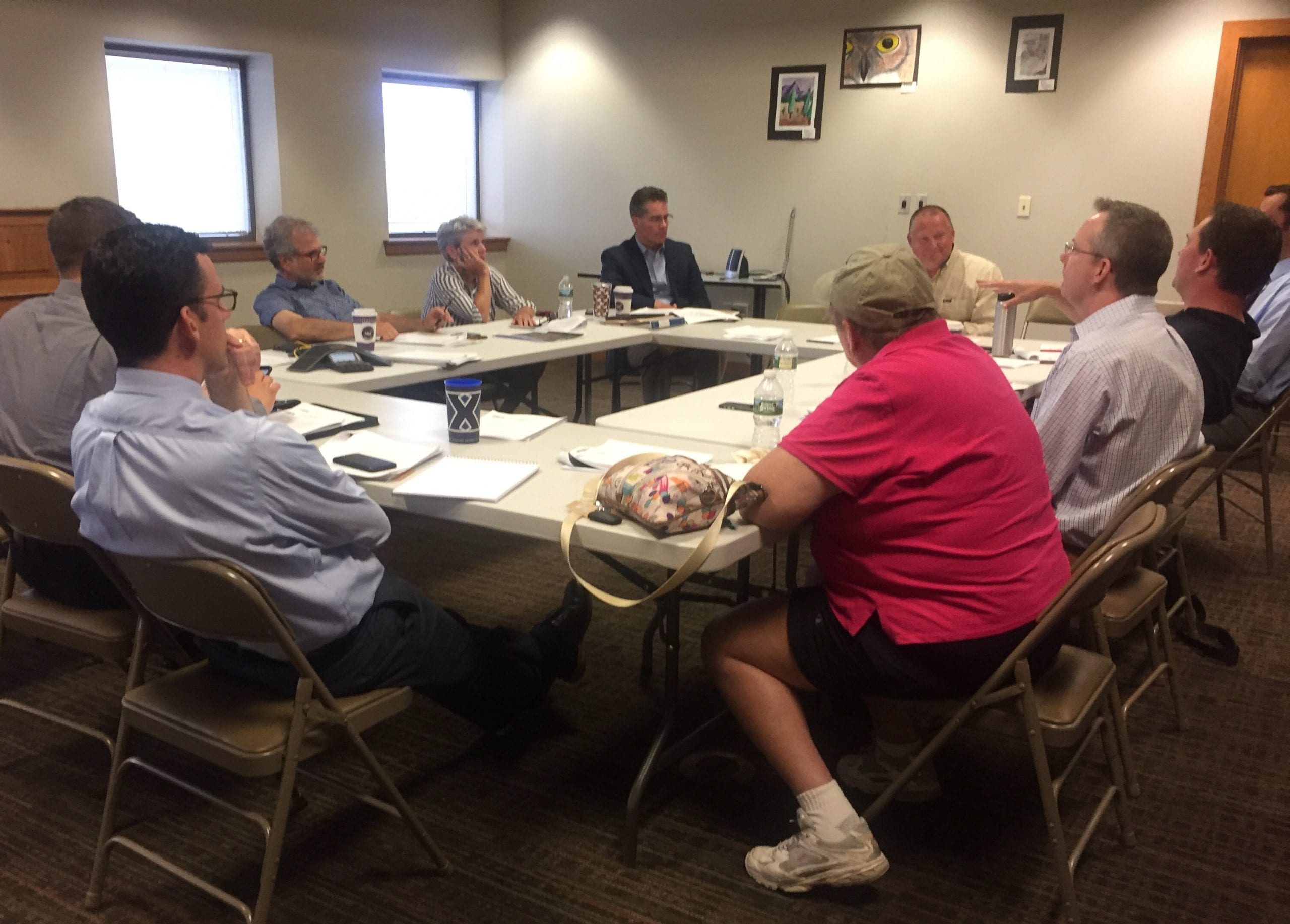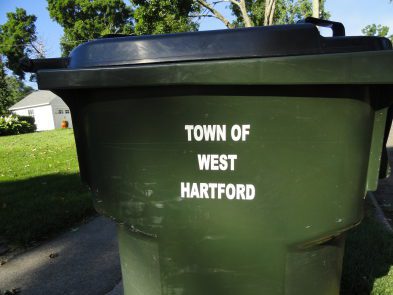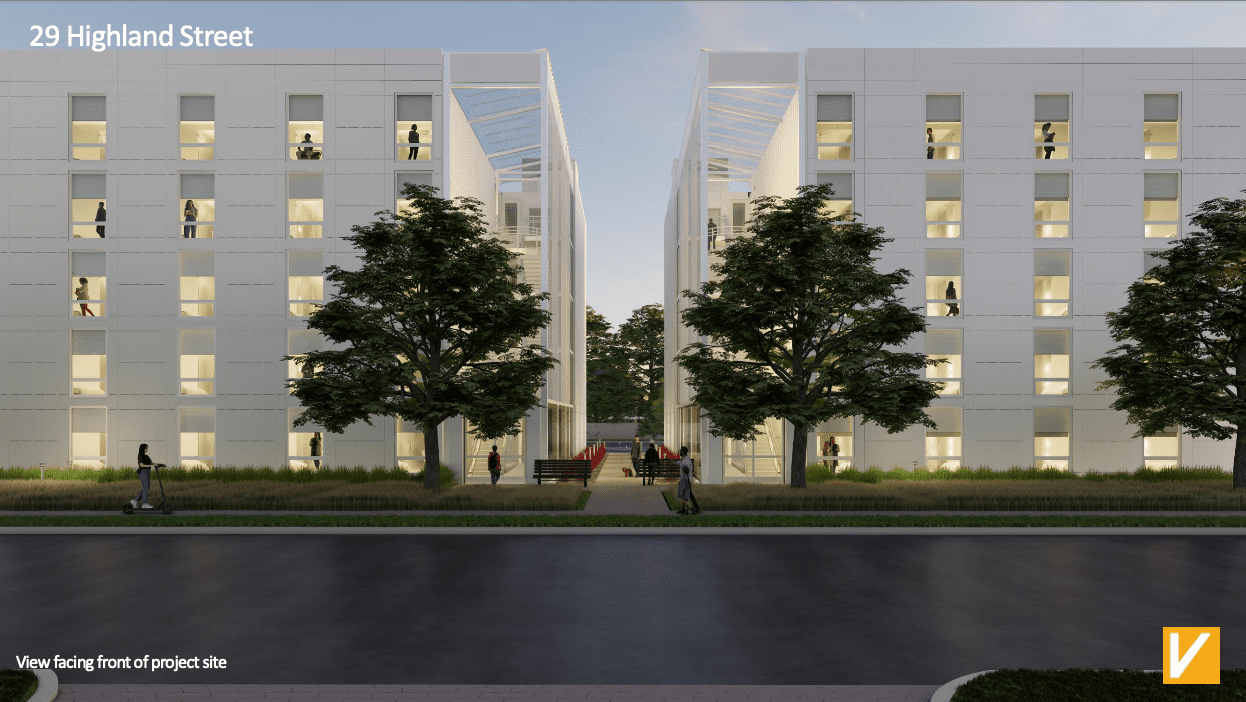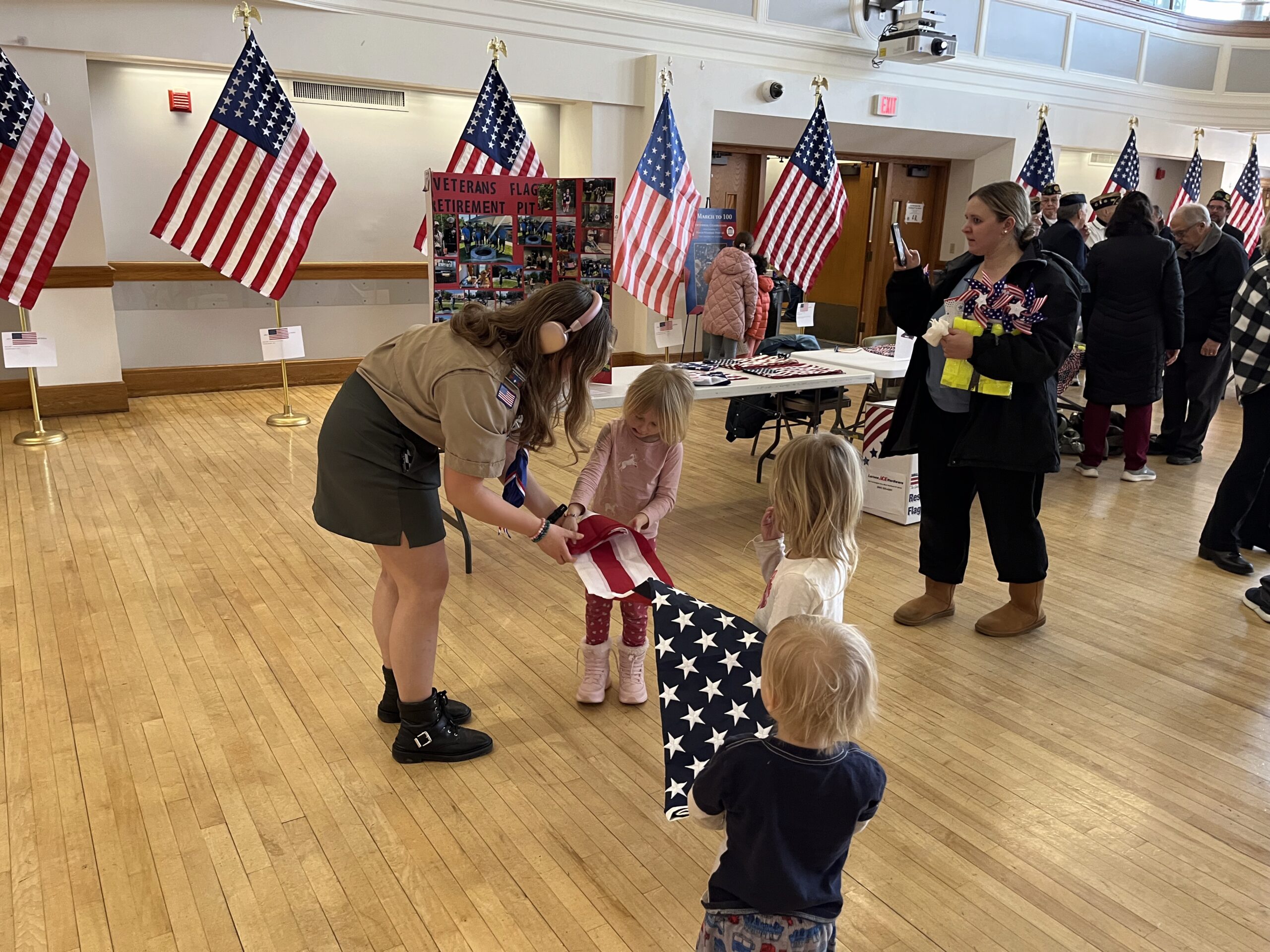West Hartford Town Council May Consider ‘Save Money Reduce Trash’ Program this Fall

Audio By Carbonatix

Director of Public Works John Phillips (back row, at right) meets with the Town Council's Community Planning and Physical Services Committee on Thursday to present his report on SMART. Photo credit: Ronni Newton
The West Hartford Town Council’s Community Planning and Physical Services Committee meeting received a report Thursday night regarding a pilot program for SMART.
By Ronni Newton
Director of Public Works John Phillips presented the Town Council’s Community Planning and Physical Services Committee with a 17-page report Thursday night, recommending an 18-month pilot program for “Save Money Reduce Trash” (SMART) as the best solution for reducing West Hartford’s solid waste.
The entire report is included in PDF form below.
Following Thursday night’s discussion, Committee members decided that they are not quite ready to recommend bringing the program to the full Town Council for a vote, and will have one more meeting later this summer to discuss issues like a calendar and what data points would be used to gauge the program’s success.

Photo credit: Ronni Newton (we-ha.com file photo)
Town Manager Matt Hart told We-Ha.com after the meeting that depending on what happens at the next Committee meeting, the program may move to the full Council for discussion and vote in the early fall. If the program were to be approved, the implementation schedule would then be set.
Phillips said he has spent several years studying SMART as an option for bringing West Hartford into compliance with the state’s goal of diverting 60 percent of solid waste by 2024 (the town’s current level is 26.6 percent), as well as keeping the town’s costs under control as waste management expenses continue to increase. SMART has been actively under discussion with the Council since early 2016.
In January 2017, more than 100 people attended a meeting at Town Hall to be educated about a potential SMART program and how it might impact them.
“A SMART (Save Money and Reduce Trash) program is a solution that reduces trash, reduces disposal costs, and gives residents more control over their budget than fees or tax increases,” states the Executive Summary of the report Phillips presented to the Committee on Thursday.
SMART would turn trash into a utility cost, with unit-based pricing. Residents would purchase a 30-gallon municipal waste bag or a smaller 15-gallon kitchen-sized trash bag, at a cost to be determined, and anything that goes into the green trash barrel would first need to go into one of those bags. Residents who have more trash would fill more of the municipal bags, but curbside collection would not otherwise be changed.
Residents would be able to purchase the official bags at a variety of local vendors including grocery and hardware stores.
“I’ve studied this, looked at it from every which way,” Phillips told the Committee on Thursday. He said he lives in a town where he has to personally contract for trash collection, at a cost of $400 per year, and thinks that he would save money if his town offered a SMART program.
“I understand that garbage is a very intimate issue,” Phillips said, and he said he also understands that moving to the program would be “a monumental decision and a huge shift in behavior.” At this point in time, with the rising cost of waste disposal, the potential that solid waste will have to be transported out of state due to maxing out of the state’s facilities, and the requirement for greater diversion, he believes there are no better solutions to protect the town from huge cost increases.
Based on results from other communities that have implemented SMART programs, Phillips believes the the town’s waste generation will be reduced by 40 percent – from about 19,000 tons per year to about 11,400 tons per year. The resulting savings in tipping costs would be about $560,000, and the sale of the specialized bags – based on a cost of $2.00 for the large bags and $1.25 for the smaller bags – would also generate about $1.66 million. Even with the cost of equipment needed to identify non-compliance, the net benefit is estimated at $2.2 million.
It would be up to the Town Council to determine the use of those savings, with options including enhancing yard waste collection – which would further reduce tipping fees or allocation to other Public Works uses. Savings could also be used to reduce the mill rate and thereby reduce residents’ property taxes.
Phillips said that based on trends, he is very worried about waste disposal in the future, and wants West Hartford to be in a position to have a much lower volume of trash “when the bottom falls out … I want West Hartford to be in the best position possible to be really resilient.”
Committee members discussed whether or not the program, if implemented, should actually be called a “pilot” since it will involve the entire community and not just a segment. They also expressed concern about educating the public and awareness that many people will not see this as a cost saving.
Minority Leader Chris Barnes said the program should be viewed as a pilot and “forward thinking.” While he said he’s not sure that he can support it, “I think I can,” he said. “You’ve done the work,” he told Phillips.
Dallas Dodge said he has not yet decided if he could support the program and asked Phillips what other alternatives exist. Phillips said that options are doing nothing and dealing with potentially rapidly escalating costs and an uncertain future for disposal capacity, or removing trash collection as a town service and having residents contract for trash removal personally, either individually or through a franchise system.
Through SMART, the town still would hold the contract, Phillips said. “Why I like the bag program is that nothing changes in your life. You go to the store and buy the bags,” he said. The number of bags you buy is determined by your own consumption, making trash like a utility, and it’s really the only way to do that because weighing the trash at the curb is not feasible, he said.
“You buy the bag, you put your trash in it, it goes away,” said Phillips. “It’s a consumer decision.”
“My concern is we’re taking a baby step, but can we take a leap to the future?” asked Deputy Mayor Beth Kerrigan. “Why can’t we go right to the food waste?” she said, noting the success of an trial program held late last year with several hundred households.
There was also discussion about perhaps providing residents with some free bags to start off the program.
Although organics recycling would potentially have a large impact on the volume of solid waste, and the trial was successful, Phillips said that the capacity for large scale organic waste recycling is not yet available.
Several other issues were discussed – including whether or not SMART, if approved, would be called a pilot. Town Manager Matt Hart said that no matter what it is called, data would be analyzed to determine whether or not objectives were being met.
Phillips said the next step will be issuing an RFP to hire a company to verify the assumptions that have been made, to confirm estimated costs of start-up and compliance monitoring as well as revenue projections, and establish a rollout plan including procuring bags.
In his report, Phillips also recommended creation of a Citizen Advisory Committee, appointed by the Town Council, if the program is launched. That Committee would meet quarterly to review the program and make a recommendation at the end of the 18-month pilot period, if that is how the implementation is handled.
“If it’s not coming together there should be a sunset,” Phillips said. “If it’s working then nothing will be needed.”
The conclusion of Phillips’ report notes that diverting more waste would have a positive financial impact, especially as tipping fees are expected to increase. “At the departmental level alternative programs have been explored including educating the public of the benefits of a SMART program, offering weekly recycling, and providing an experimental food waste collection program. Organics collection has been added at the schools. Tools have been provided to the public including a waste wizard to help with recycling questions, an enhanced website, a restructuring of the yard waste and recycling permit process and added more options to recycle including electronics collection, mattress collection, and paint collection.”
Continuing to expand recycling will also provide opportunities to divert more materials from the waste stream, and the SMART incentivizes participation in those programs.
“The objective of the solid waste management program is to provide cost effective service, best practices, sound planning, and provide good stewardship of public funds. A SMART bag program helps the Town meet all its objectives,” Phillips’ report states.
Like what you see here? Click here to subscribe to We-Ha’s newsletter so you’ll always be in the know about what’s happening in West Hartford!
 Loading...
Loading... 



This is insane! Taxes in West Hartford are already way too high. Now you want to add to the burden by charging per bag of trash. There should be meetings about how to reduce the mill rate and reduce the burden on residents and businesses in the town.
This is liberal progressivism at its worst. $2 bags will not change behaviors. It will not stop me from putting grass in my trash bin. If there is really a trash crisis, charge $10 a bag
The town pays $66 per ton in tipping fees, which equates to a little more than 30 pounds per dollar. For a taxpayer’s extra $2 bag fee to match the current value of refuse disposal, the bag would have to hold 60 pounds of garbage.
Our typical week of garbage for a household of two has around 10 pounds of trash, and if something is too big for a bag it goes into the bin by itself. In this case, getting the current value for disposing 60 pounds of garbage requires 6 bags at a cost of $12. The bags of shredding shown at the presentation might weigh 2 pounds each, for a cost of $2000 per ton to dispose of.
By confusing measures of volume and weight, the town will increase the cost per pound for residents by 600%.
Phillips projection of $560000 savings is less than $10 per resident at a cost of at least $110 per year per household. The people of West Hartford deserve better than this. His statement that the “program is to provide cost effective service” couldn’t be further from the truth. This is a very small part of the town’s budget.
I attended two of the presentations on this subject and the comments were mostly against the proposal. Despite this, the town is still trying to push this agenda.
In out house we currently have more recycling than garbage and believe that society benefits from lower levels of waste. I object to this heavy handed intrusion through a program that increases cost and inconvenience to those who are currently minimizing their impact on the situation.
If you think there is a better way to address this, write to the council to make your concerns known and copy the town clerk.
SEVERAL THINGS are not acceptable with this proposal. First, waste removal is calculated in our taxes- where is the announcement of our taxes being reduced because we will be ripped off with this program???? The monopoly on these bags is a complete SCAM. I find it funny that WH is in such a panick over waste removal when you don’t hear about it anywhere else. To have this guy Phillips say this is our only option is negligence at its finest. If this is the ONLY option he can come up with, he needs to go. I’d rather pay for my own garbage removal than have this “program”. Let me remind council members- you saw what happened with the toll booth proposal- WE WANT NO MORE ADDITIONAL TAXES, BILLS, ETC. If not, you will not be elected another term. Use your education to come up with alternatives that don’t increase monetary burdens on an already OVER TAXED population. If you cannot do this, either step aside or stop with the nonsense proposals.
Phillips’ proposal shows “net benefit to town” of $2.2 million part of which is $564k in tipping fee reduction. This is from the sale of over 1.1 million bags (great way to save the environment!). The last time I checked the town government was for our benefit, not the other way around.
The program name suggests saving money but that is an outright lie. The tipping portion of our trash service is far below the cost of buying just one bag per week. There are also plenty of items that won’t fit in a bag. How do you throw away a broom in a 30 gallon bag?
We just passed a budget with the town manager’s estimates for road and vehicle maintenance, as well as the general operation of the town. After that a referendum petition went unsupported because of the publicly known budget. This is simply sneaking an additional tax to extract an extra $2 million out of the taxpayers after the threat of referendum has passed.
If the council is so concerned with the capacity of our landfills, why do we keep approving fast food restaurants in town? Every meal is a wad of wrappers and cups to the landfill. If we have codified our goals with a Plan of Conservation and Development (PoCD) we shouldn’t apply it inconsistently taxing residents to solve a “crisis” and approve restaurants that contribute to the severity of the same “crisis”.
Converting existing 90 gallon bins to 65 gallons would be an excellent use of recycling and would cut weekly capacity by one third. Those who need more capacity could pay for additional bins. These measures would fit it with the PoCD, but without a rogue tax or micromanaging residents.
Waste Zero stands to make a lot of money from this. If the town goes through with this we should get a rebate for all of the bags if the promises made aren’t kept. For the sake of credibility, the town should keep revenue generation and trash collection separate. Having a rogue tax levied by a town department that falls outside the normal budgeting process is devious and subject to abuse.
Wow Art what an excellent argument. I knew that I did not like this but didn’t have the extra information to make an informed decision. I love the bin restriction. Thanks for your viewpoint! I will be adding this to a letter to the town.
This is nothing more than an additional tax coming from a town department. The added cost of the bags is intended to save a modest amount in tipping fees. The big point of this is added revenue of 1.6 million to fund what? More programs!
The costs associated with curbside collection would remain the same or go up due to added enforcement and truck retrofits. Only the tipping fees are affected by this. Since we don’t own trucks anymore, Paine’s would have to install and maintain the cameras in the trucks. Good luck with that.
If more town programs need funding, let them fund themselves. More yard waste pickup is worthwhile, charge for yard bags then. If no one buys them the program had no merit.
Manchester is reducing their bin sizes to 65 gallons from 95 gallons. If someone wants the larger container they can rent it for $200 per year. This approach makes a lot more sense than hiring garbage inspectors to look for bags and adding them to the pension problems we face.
http://www.courant.com/community/manchester/hc-news-manchester-trash-barrels-0616-story.html
I agree with Ken that this is the ugly side of progressive thinking. It can serve to drive out reasonable people and concentrate voters who like this sort of thing.
If we are going to charge people by the services they use, let’s start with the schools, then libraries, then assess homes by frontage for street maintenance. The town can put GPS trackers in our cars to figure out who uses the roads the most.
Please note that there are no plans to hire garbage inspectors. The start-up costs under the SMART program would be for educating the public and cameras for the trucks. ~Ronni
There’s a business dumpster about 1/4 mile from my house. Guess where my trash is going if this is put through.
[…] a meeting of the Town Council’s Community Planning and Physical Services Committee on June 14, Director of Public Works John Phillips presented a 17-page report, recommending an 18-month pilot […]